I wake to NPR on the radio. The world is in my ear, and my house bustles with all the usual things—kids and Minecraft, soccer practice, laundry. I scramble to complete enough work so I can walk away. I mainline coffee in this last minute hurricane of preparations to leave.
The chickens are fed. The cars are tucked into the garage. The automatic timer on the garden sprinkler is set. The auto-responder on my email says my family is going off-the-grid for three weeks. We are leaving the schedules and online calendars that rule our every waking moment, saying so long to the social media which reports our daily dramas, unplugging all those irresistible electronic devices.
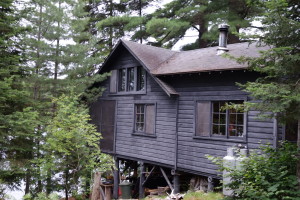
I am going home.
It will take all day.
By plane then car then boat, we are pointed like a compass needle to a singular place.
At the far end of long, sprawling lake in Algonquin Park, its bays spreadeagled to the west and east, is a tiny piece of perfect built by my grandmother in the 1930s. The main cabin has a wood stove, a few propane lights, a propane oven and fridge. A hand pump brings water into the kitchen from the lake. Our drinking water comes from a spring on a nearby shore. There are two small sleeping bunkies and two outhouses.
Home.
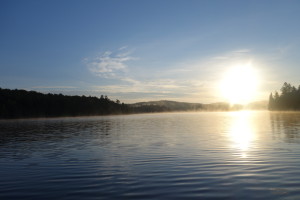 I wake to an expanding blue. Balsam tree tops sweep across this newborn sky, tickling dawn as the sun springs over the end of the lake. Through the open windows over my bed, the maples stretch and sway. Small things—deer mice, red squirrels, toads—rustle in the crispy layer of last year’s leaves.
I wake to an expanding blue. Balsam tree tops sweep across this newborn sky, tickling dawn as the sun springs over the end of the lake. Through the open windows over my bed, the maples stretch and sway. Small things—deer mice, red squirrels, toads—rustle in the crispy layer of last year’s leaves.
We heard wolves in the dark of the morning. First the pups yipping all at once. I can tell instantly they are in the beaver meadow behind the cabin. An adult on a distant hill howls to the pups. I imagine she is saying I’m coming home soon.
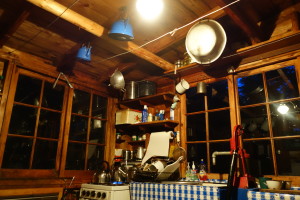 My daughter has already squirmed from under her pile of down quilts and Hudson bay blankets in the bed beside mine. She will be with my mother in the main cabin, drinking cocoa. Leaving my husband and son sleeping, I slip out of my own warm cocoon into chilly clothes, and I follow her, ready to wrap my hands around a seventy-year-old enamel mug of hot coffee.
My daughter has already squirmed from under her pile of down quilts and Hudson bay blankets in the bed beside mine. She will be with my mother in the main cabin, drinking cocoa. Leaving my husband and son sleeping, I slip out of my own warm cocoon into chilly clothes, and I follow her, ready to wrap my hands around a seventy-year-old enamel mug of hot coffee.
Home.
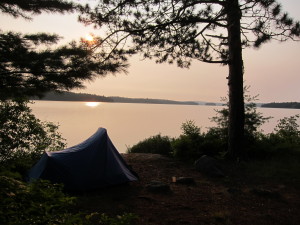 I wake to a scattered patter of droplets on the roof of the tent. The boughs above are shaking off last night’s rain. Beside me in a silky hiss of nylon, my husband rolls over in his sleeping bag. Out on the lake a loon wails at the morning and the warbling call of another in flight responds from over the treetops.
I wake to a scattered patter of droplets on the roof of the tent. The boughs above are shaking off last night’s rain. Beside me in a silky hiss of nylon, my husband rolls over in his sleeping bag. Out on the lake a loon wails at the morning and the warbling call of another in flight responds from over the treetops.
We have followed in my grandmother’s footsteps once again. For much of her youth, the cabin she built was a staging ground for her canoe guiding business, a place to store canoes and paddles, cook pots and canvas Duluth packs over the winter. Each summer she packed her canoes, picked up her clients from the train station, and led them into the Canadian bush. Like her we have left the cabin and entered the wild backcountry where all we need to do is paddle the lakes and carry our loads and wait for the world to unfold before us.
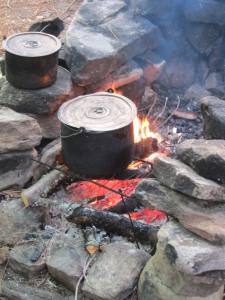 Doing my best tent contortions, I dress, slipping on three-day socks and push my feet into night cold boots. Unzipping the door I stretch into the day. This morning and every morning on our nine-day canoe trip, I am the first one to emerge. My children still sleep in the tent beside mine. I hear the low murmur of voices from my parents’ tent. They will wait for me to light the fire and put water on for coffee before they emerge.
Doing my best tent contortions, I dress, slipping on three-day socks and push my feet into night cold boots. Unzipping the door I stretch into the day. This morning and every morning on our nine-day canoe trip, I am the first one to emerge. My children still sleep in the tent beside mine. I hear the low murmur of voices from my parents’ tent. They will wait for me to light the fire and put water on for coffee before they emerge.
Home.
I wake to the grey-orange haze of the pre-dawn city in the distance. The crickets who buzzed and hummed me to sleep have finished with their amorous singing for the night. The only sounds are the steady breath of my sleeping husband and the click-click-click of the ceiling fan. I have to remind myself where I am, a world away from lake steam rising golden in a new-risen sun.
I pad to the bathroom careful not to wake my family. I don’t bother with lights. I’m used to waking in the dim light of early morning, and my fingers have nearly forgotten switches. The flush toilet and rush of warm tap water startle me. Wrapped in my robe, I stare at the coffee maker, trying to remember where the water goes, how to grind the beans. Tentatively I hit the switch, and instantly the shiny machine begins to gurgle, enveloping me in the smell of morning.
There is laundry which smells of wood smoke and mosquito repellent, and mail to be sorted and email-facebook-twitter ready to pounce.
But not yet.
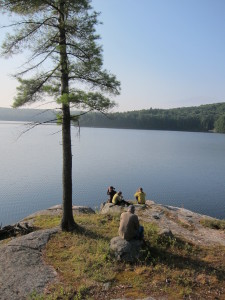 There are words, swirling through me like this oh-so-strong-the-way-I-like-it coffee. They have been carried from lake to lake on portages lined with ferns and false Solomon’s seal and wild raspberries. They have slid through clear, deep water on the maple blade of my paddle. They rise intent and exuberant like a wolf call, like my children from sleep, like a homeward-headed airplane.
There are words, swirling through me like this oh-so-strong-the-way-I-like-it coffee. They have been carried from lake to lake on portages lined with ferns and false Solomon’s seal and wild raspberries. They have slid through clear, deep water on the maple blade of my paddle. They rise intent and exuberant like a wolf call, like my children from sleep, like a homeward-headed airplane.
Like my keening heart which always tends toward its very best place.
Home.
Beautiful. Brought tears for the gone days and the joy that will not come again.love g
I am holding out hope that you will return some day and feel Beth’s presence there. There is so much love.
OMG Amber, somehow I got to your blog and you took me to Smoke Lake, a place I’ve wanted to experience for years. And I kept on reading. It is now 3 hours later…1:00am. Your writing sucks me up and blows me away. I want to grow up and be like you!
Oh Laurey, you made my day! (Sorry I wrecked your bedtime though!) XO
Amber this is just beautiful. All of us who love Algonquin can re-read this when we need that fix that fills us! The pictures are a perfect supplement to your text!
Amber, you sure have a beautiful way with words. Makes me miss “home” even more.